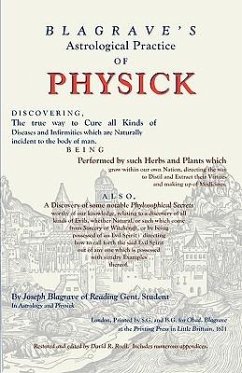Contrary to modern beliefs, the medieval world was not one of superstition and ignorance. True, they lacked what we know as science, but on the other hand, they were in possession of a coherent philosophy of life, handed down to them from the Greeks and Romans, which had been further hammered out in a thousand ways over the course of centuries. When luck was with them (the period was, above all, poor), medieval peoples were surprisingly successful in dealing with the problems of everyday life. With minds open, we come to the medieval world as if it was a strange alien planet. Because their philosophy was different, their observations were different, and, therefore, their solutions were different. Some were good. Some were not. The best of them are worthy of our attention, for they can teach us much. The author, Joseph Blagrave (1610-1682), was a country doctor who lived in Reading, England, in part as he lacked the license that would let him practice openly in London. Fundamentally, he was an astrological herbalist. To this, he brought an eclectic mix of observation, experimentation, folk knowledge, and his own unique genius. Free of modern conceptions, he was able to view and treat the diseases of his day in ways that were revolutionary.








